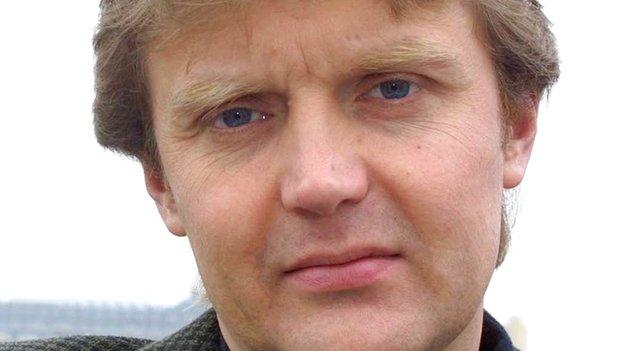Timeline: Alexander Litvinenko death case
- Published
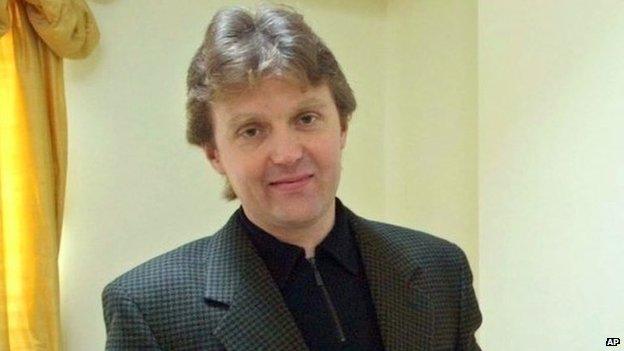
Ex-Russian agent Alexander Litvinenko died in a London hospital on 23 November 2006 from radiation poisoning.
His death sparked a series of claims and counter-claims over who was responsible, and even led to a political row between the UK and Russia, resulting in diplomats and officials being expelled on both sides.
Here are some of the key events leading up to and since Mr Litvinenko's death.
1 November 2006
Mr Litvinenko meets two Russian men at the Pine Bar in London's Millennium Hotel - Dmitry Kovtun and Andrei Lugovoi, a former KGB officer.
He also meets Italian academic Mario Scaramella at a Itsu sushi bar in central London, where he is said to have received documents about the death of Russian journalist Anna Politkovskaya.
Several hours after his meetings, Mr Litvinenko complains of feeling sick and spends the night vomiting.
4 November
After three days of sickness and stomach pains Mr Litvinenko is admitted to Barnet General Hospital, north London.
17 November
Mr Litvinenko is transferred to the University College Hospital, in central London, as his condition worsens. He is placed under armed police guard.
19 November
It is reported Mr Litvinenko was poisoned with thallium, a highly toxic chemical once used to poison rats.
20 November
Mr Litvinenko is moved to intensive care. Pictures are released of the ex-agent in hospital, showing how he has suffered dramatic weight and hair loss.
Scotland Yard's counter-terrorism unit takes over the investigation into what made him ill. Police say they are treating the case as a suspected "deliberate poisoning" but await toxicology test results.
The Kremlin dismisses allegations that the Russian government poisoned Mr Litvinenko because of his criticisms of its policies as "sheer nonsense".
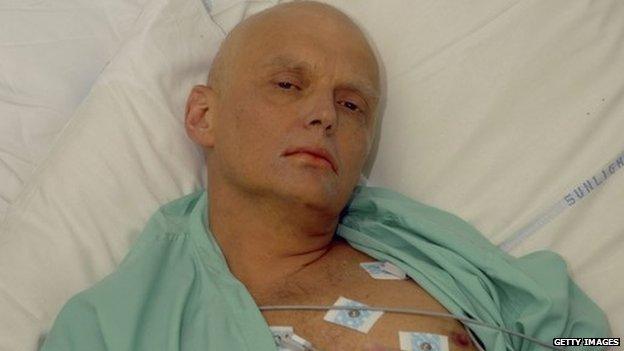
Alexander Litvinenko lost his hair as part of his illness
22 November
Mr Litvinenko is described as "critically ill" and has a heart attack overnight.
Russia's foreign intelligence service denies involvement in the apparent poisoning of Mr Litvinenko.
23 November
Mr Litvinenko dies in intensive care.
Scotland Yard says it is now investigating "an unexplained death".
24 November
A statement made by Mr Litvinenko before he died is read out by his friend Alex Goldfarb outside University College Hospital, London.
In it he accuses Russian President Vladimir Putin of involvement in Mr Litvinenko's death and says his killer was "barbaric and ruthless".
Friend Andrei Nekrasov says that just hours before Mr Litvinenko fell unconscious, he told him: "The bastards got me but they won't get everybody."
Mr Putin, at a press conference, says Mr Litvinenko's death was a tragedy, but he saw no "definitive proof" that it was a "violent death".
Mr Litvinenko's father, Walter, tells reporters his son was killed by a "tiny little nuclear bomb".
Health experts say they believe Mr Litvinenko was deliberately poisoned by radioactive matter, believed to be polonium-210.
Police find traces of radioactive material at the sushi bar and the hotel where the former spy had meetings on 1 November, and at his north London home.
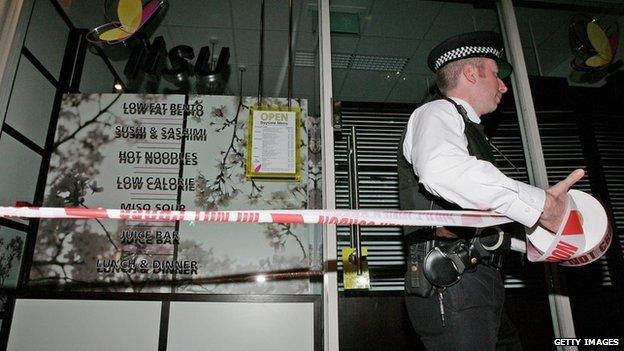
Police sealed off the Itsu sushi bar in London
30 November
An inquest into the death of Mr Litvinenko is opened and adjourned at a London court.
1 December
Italian academic Mario Scaramella tests positive for a significant amount of polonium-210, although he has not suffered any symptoms of poisoning.
It is also revealed that Mr Litvinenko's wife, Marina, has tested positive for the alpha particle-emitting substance, although she is not admitted to hospital and is not believed to be in any danger.
4 December
Nine British police officers travel to Moscow to pursue their investigation into Mr Litvinenko's death.
5 December
Russia's prosecutor general, Yuri Chaika, says he will not extradite suspects in the poisoning of Mr Litvinenko to Britain.
Mr Chaika says any trial of a Russian citizen must take place in Russia and that it would be "impossible" for British officers to arrest Russians in their home country.
Russian prosecutors say they intend to question former KGB bodyguard Andrei Lugovoi.
6 December
British police say they are now treating the death of Alexander Litvinenko as murder.
Mr Scaramella is discharged from University College Hospital. Doctors say he had not shown any sign of illness.
7 December
Russia says it is investigating the attempted murder of Dmitry Kovtun, the contact of Mr Litvinenko who met him at the Pine Bar.
All seven bar staff working at the Pine Bar at the time test positive for low levels of polonium-210.
Meanwhile, about 50 mourners - including his wife, son and parents - see Mr Litvinenko buried at North London's Highgate Cemetery.
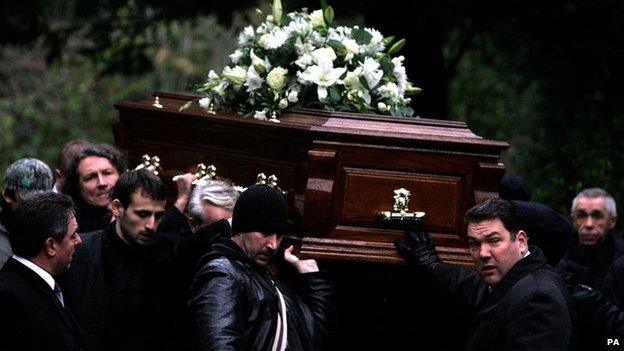
Alexander Litvinenko was buried in London
9 December
Police in Germany say they have found indications of radiation in two properties apparently used by Mr Kovtun - the Hamburg flat of his ex-wife, and her mother's home outside the city.
Mr Litvinenko's widow, Marina, says she believes the Russian authorities could have been behind his murder in an interview with the Mail on Sunday.
She tells the paper: "Obviously it was not Putin himself, of course not."
But she says what President Putin "does around him in Russia makes it possible to kill a British person" in Britain.
16 December
Former spy Yuri Shvets claims Mr Litvinenko was murdered because of information he held on a powerful Kremlin figure.
Mr Shvets, a former business associate of the murdered former KGB man, says he was poisoned after the dossier, which had damaging details, was deliberately leaked to the high-ranking Moscow figure.
12 January 2007
Russian prosecutors ask the UK for permission to question more than 100 witnesses over the poisoning of Mr Litvinenko.
22 January
BBC One's Panorama programme reports there may have been multiple attempts to kill Mr Litvinenko before he died.
It says the first attempt to poison him may have come two weeks before he met Mr Scaramella in the sushi bar.
The programme says it may have been at the same restaurant, but occurred when Mr Litvinenko met Andrei Lugovoi and Dimitri Kovtun on 16 October.
Mr Litvinenko's widow tells the programme her husband's poisoning could not have been carried out without Russian President Vladimir Putin's knowledge, but Mr Putin's spokesman, Dimitry Peskov, vehemently denies this.
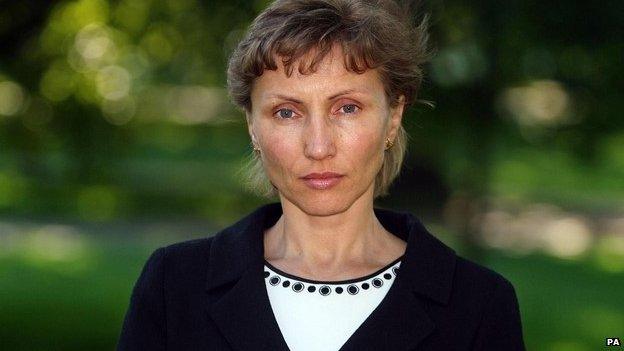
Marina Litvinenko claims Russian President Vladimir Putin had knowledge of her husband's death
30 January
Mr Lugovoi and Mr Kovtun, the two Russians questioned by British police over the poisoning of Mr Litvinenko, deny being suspects in the case.
They tell a Russian TV station that UK press reports describing them as suspects were "a lie".
31 January
Scotland Yard hands a file on the investigation into the death of Mr Litvinenko to the Crown Prosecution Service.
The BBC's security correspondent, Frank Gardner, says police sources have told him that the "finger of suspicion" pointed "clearly" at former KGB officer Mr Lugovoi.
But Mr Lugovoi has said he was also a victim of radiation poisoning.
4 February
The Home Office confirms Russian detectives investigating Mr Litvinenko's death have asked for permission to come to the UK.
6 February
Boris Berezovsky breaks his silence to tell BBC's Newsnight that Andrei Lugovoi was responsible for the death of his close friend, Mr Litvinenko.
He says Mr Litvinenko told him: "I think Lugovoi is involved in my poison," but the former KGB agent denies any involvement.
8 February
The number of people affected by polonium-210 and facing possible health risks reaches 15, after two more people test positive, the Health Protection Agency says.
22 May
Mr Lugovoi should be charged with the murder of Mr Litvinenko, the director of public prosecutions recommends.
Sir Ken Macdonald says that Mr Lugovoi, who denies involvement in the death, should face trial.
31 May
Speaking at a news conference in Moscow, Mr Lugovoi says Mr Litvinenko was not his enemy and that he had nothing against him. He claims that Mr Litvinenko was a British spy.
Mr Lugovoi also says the British secret service tried to recruit him to provide "compromising information" on President Putin.
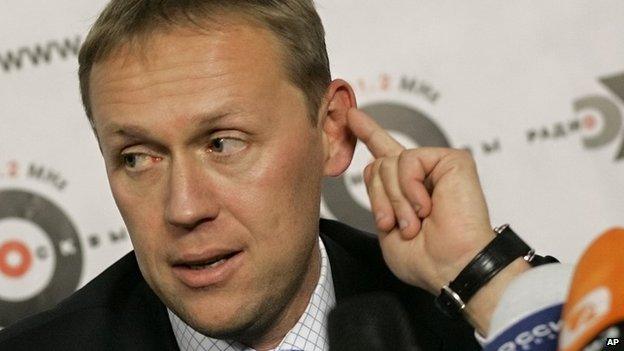
Andrei Lugovoi denies killing Alexander Litvinenko
5 July
Russia officially refuses a UK extradition request for Mr Lugovoi.
The Russian Prosecutor General's Office says the constitution did not allow for the extradition of its citizens.
16 July
The government announces it is to expel four diplomats from the Russian embassy in London, after Moscow refused to extradite Mr Lugovoi.
Foreign Secretary David Miliband also says co-operation with Russia on a range of issues was under review.
19 July
Russia announces it is to expel four British embassy staff, mirroring the UK's decision to expel four staff from the Russian embassy in London.
The four are given 10 days to leave the country, and Moscow says it is also to review visa applications for UK officials.
Foreign ministry spokesman Mikhail Kamynin says co-operation in counter terrorism will no longer be possible.
June 2013
A inquest into Mr Litvinenko's death is delayed as the coroner decides a public inquiry would be preferable, as it would be able to hear some evidence in secret.
July 2013
UK government ministers rule out a public inquiry into Mr Litvinenko's death, saying an inquest would be an effective investigation into his death.
Jan 2014
Marina Litvinenko takes up a case in the High Court to force the UK government to hold a public inquiry into her husband's death.
11 Feb
The High Court says the Home Office had been wrong to rule out a public inquiry before the outcome of an inquest.
22 July
A public inquiry into Mr Litvinenko's death is announced by UK Home Secretary Theresa May. It is due to conclude by the end of 2015.
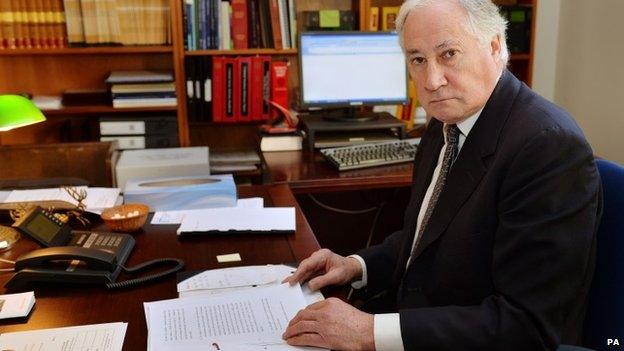
Sir Robert Owen is the chairman of the public inquiry into Mr Litvinenko's death
- Published27 January 2015
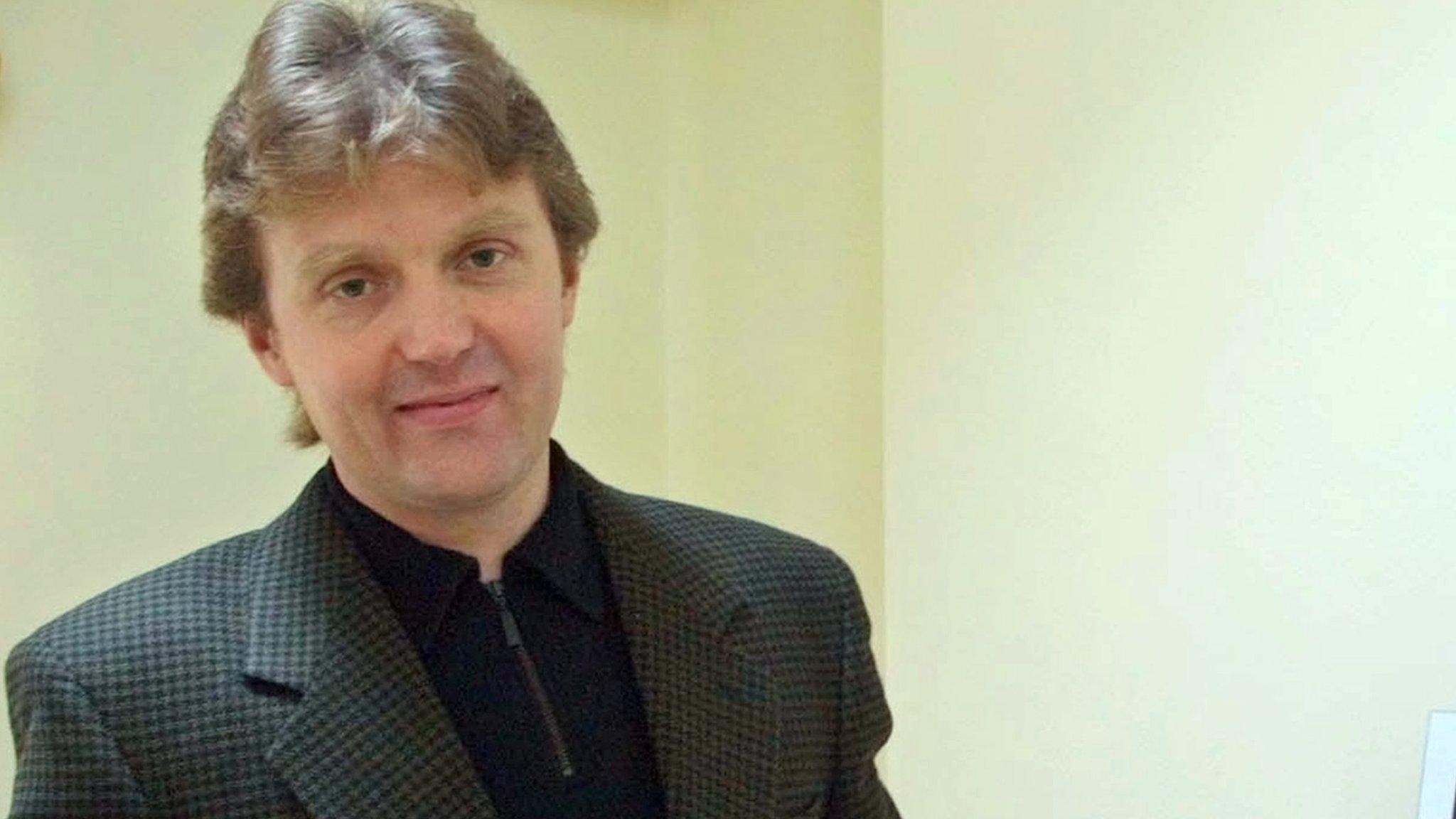
- Published21 January 2016
